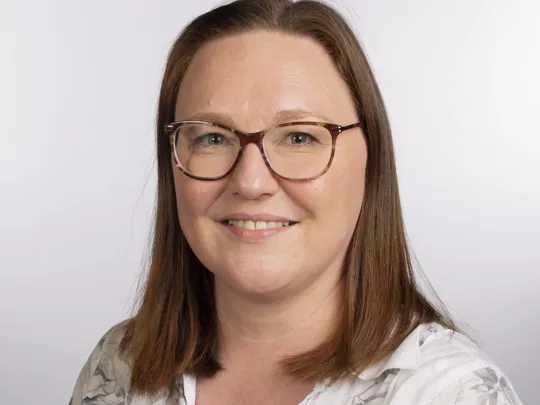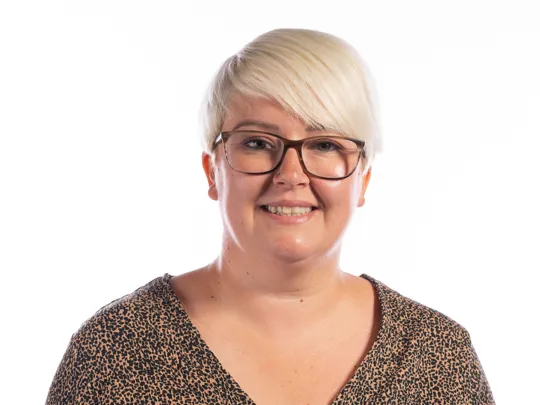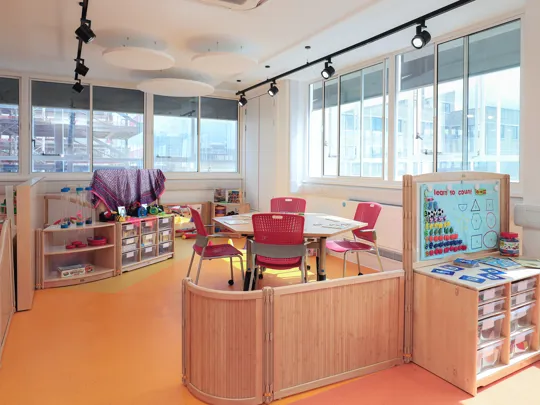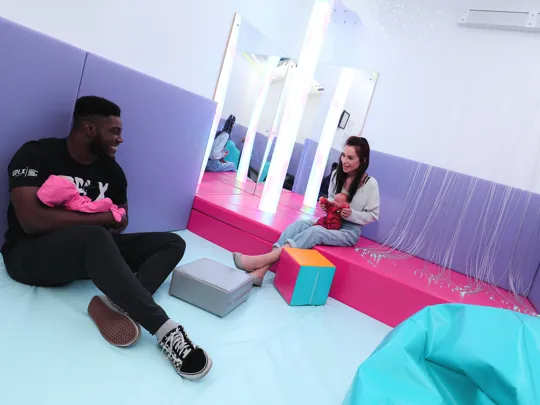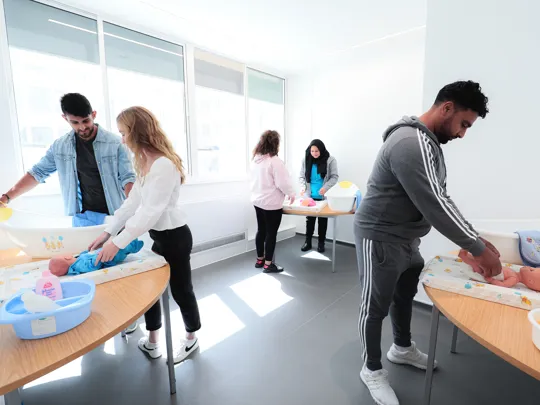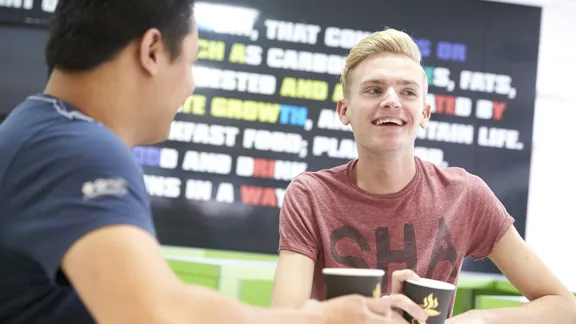of graduate employers say relevant experience is essential to getting a job with them
Why choose this college course?
- WORK PLACEMENT – Gain first-hand experience of working with children by undertaking placements in environments such as nursery schools, day nurseries or specialist settings
- BOOST YOUR SKILLS – Learn how to help children develop through learning activities and play, as well as how to support young children and keep them safe
- MOVE UP TO UNIVERSITY – Want to keep studying at a higher level? This childcare and education diploma will support your progression to degree level
Our facilities
Students on our college education and childcare courses have the opportunity to learn in our Early Years simulation and practice development suite, providing a safe environment to help you prepare for placement, consolidate your learning and further refine your skills guided by our experienced staff.
Early Years Simulation Suite
Take a look around our Early Years Simulation Suite that aims to boost your experience before you complete your studies.
Course breakdown
Topics you will study:
Year 1
- Child Development from Conception to Seven Years
- Providing Safe Environments for Children
- Children’s Health and Wellbeing
- Play and Learning
- Child Health
- Understanding Children’s Additional Needs
- Observation, Assessment and Planning
- Professional Practice Portfolio 1
Year 2
- Supporting Literacy
- Supporting Maths
- Preparing for School Readiness
- International Perspectives
- Reflective Practice for Professional Development
- Professional Partnership in the Early Years
- Professional Practice Portfolio 2
Please note: Units/topics of study are subject to change
You will also have an individual study programme to help you build the skills and experience you need to progress onto higher education or gain employment.
Maths and English
To help you secure your dream career, you will also continue developing your maths and English skills alongside your full-time course. If you haven’t achieved GCSE grade 4/C in English and maths at age 16, you will continue to study these through resits or taking Functional Skills at an appropriate level.
How maths will support your career
- For young children, learning basic numbers and their differences is a key foundation block in their learning and central to the National Curriculum.
- In a nursery, the ability to calculate parent payments is very important.
How English will support your career
- Accurate spelling and a wide and specialist vocabulary are key when working with children and parents.
- Good quality speaking and listening skills are needed when communicating with colleagues, children and parents.
- The National Curriculum requires that children develop good English skills in speaking and written communication.
- Accurate reading is a vital skill when using medical documents as well as when following health and safety guidelines.
- Secure English is important when preparing a CV.
Entry requirements
Our education lecturers are looking for students who are committed, enthusiastic and have a desire to excel in the early years and care sector, so please contact Admissions if you do not have the specific requirements outlined below.
If you are unsure if your qualification is equivalent or if you wish to check if you meet the entry requirements for this course, please call 0121 214 2919, email feadmissions@ucb.ac.uk or use our live chat.
Academic requirements
- 4 GCSEs at grade 4 (grade C) including English (Language or Literature).
- A minimum GCSE Maths of grade 3 (grade D) is also required.
English and maths
If you do not have a grade 4/C or above in English and maths and you are under 19, you will be required to study these subjects alongside your vocational subject. After enrolment you will complete an assessment with our teaching team so we can ensure you receive appropriate English and maths support.
Applicants over 19 are not required to complete maths and English.
Supporting documents required
- School applicants will be required to provide a good school report, which must include attendance. This will be assessed in conjunction with your qualifications and application during the confirmation of your place at University College Birmingham.
- If you are a school leaver (over 19), you will be required to provide a reference from a previous education provider or employer in support of your application.
Disclosure and Barring Service (DBS)
This course requires a Disclosure and Barring Service (DBS) check. Information about the DBS check and how to apply for it will be sent to you by our placement team after enrolment. University College Birmingham will coordinate and fund the completion of the DBS check.
Guaranteed progression
Students who achieve 56 UCAS points or more from this qualification will automatically be guaranteed a place on a degree course at University College Birmingham. Some undergraduate courses require additional entry requirements, so applicants are advised to check entry requirements before applying.
Key information
Teaching and assessment
There is a range of assessments throughout the course and you will also be assessed during your placement.
Our teaching and assessment is underpinned by our Teaching, Learning and Assessment Strategy 2021-2024.
Uniform and kit costs
This course requires a uniform and kit costing approximately £30, depending on the items you purchase. (Prices are subject to change each year – exact costs and information on how to order required items will be provided to you prior to enrolment.)
Work placements
Work placements offer a wealth of benefits alongside your studies, helping you put your learning into practice, develop your skills and understanding of the workplace, boost your CV for your chosen career or enhance your UCAS application for higher education. Our Hired employability team can help find the ideal placement for you.
Students on our childcare college course will need to complete two days per week on placement in an appropriate setting working with children. You will complete 750 placement hours in total during your course, supported by a professional in a real work environment.

Coming to University College Birmingham was the best decision. Placement was the highlight, the opportunity to carry out the theory on children's developmental milestones I learned in college. I worked closely with my employability tutor and assessor on this and built my confidence in working with professionals, children and their families.
Career opportunities
The example roles and salaries below are intended as a guide only.
Teaching assistant
Average Salary: £23,000
Nursery worker
Average Salary: £19,000
Special educational needs (SEN) teaching assistant
Average Salary: £17,789
Nanny
Average Salary: £32,500
Early years educator
Average Salary: £18,526
Family support worker
Average Salary: £21,000
Aspiring to a higher level career? Complete this course and you could progress onto our Early Childhood Studies degree.

Jaye’s Story
Jaye finished her college course and went on to degree level to give her the best advantage in her goal to teach young children.
Meet your tutors

